Vegan Globetrotter is supported by our audience. When you purchase through one of our links, we may earn a small affiliate commission. As an Amazon Associate I earn from qualifying purchases. Your cost is not affected.
==================
Pumpkin seeds, often overlooked, pack a powerful punch of nutrients that can significantly boost your health. Rich in magnesium, zinc, and healthy fats, these tiny seeds support everything from heart health to immune function. They’re also an excellent source of plant-based protein, making them a perfect addition to any diet, especially for those seeking nutrient-dense snacks. Whether you want to enhance your bone health, improve sleep quality, or indulge in a crunchy, flavorful treat, pumpkin seed nutritional benefits cater to various wellness goals.
Beyond their health perks, these seeds are incredibly easy to incorporate into your daily routine. Sprinkle them over salads, blend them into smoothies, or add them to baked goods for a nutty, nutritious twist. They even make a satisfying snack, roasted with a dash of your favorite seasoning. In this article, we’ll dive deep into the impressive nutritional benefits of pumpkin seeds and explore creative ways to enjoy them in your meals. Prepare to discover why these tiny powerhouses deserve a permanent spot in your pantry!
Unlocking the Power of Pumpkin Seeds: Nutrition and Creative Uses
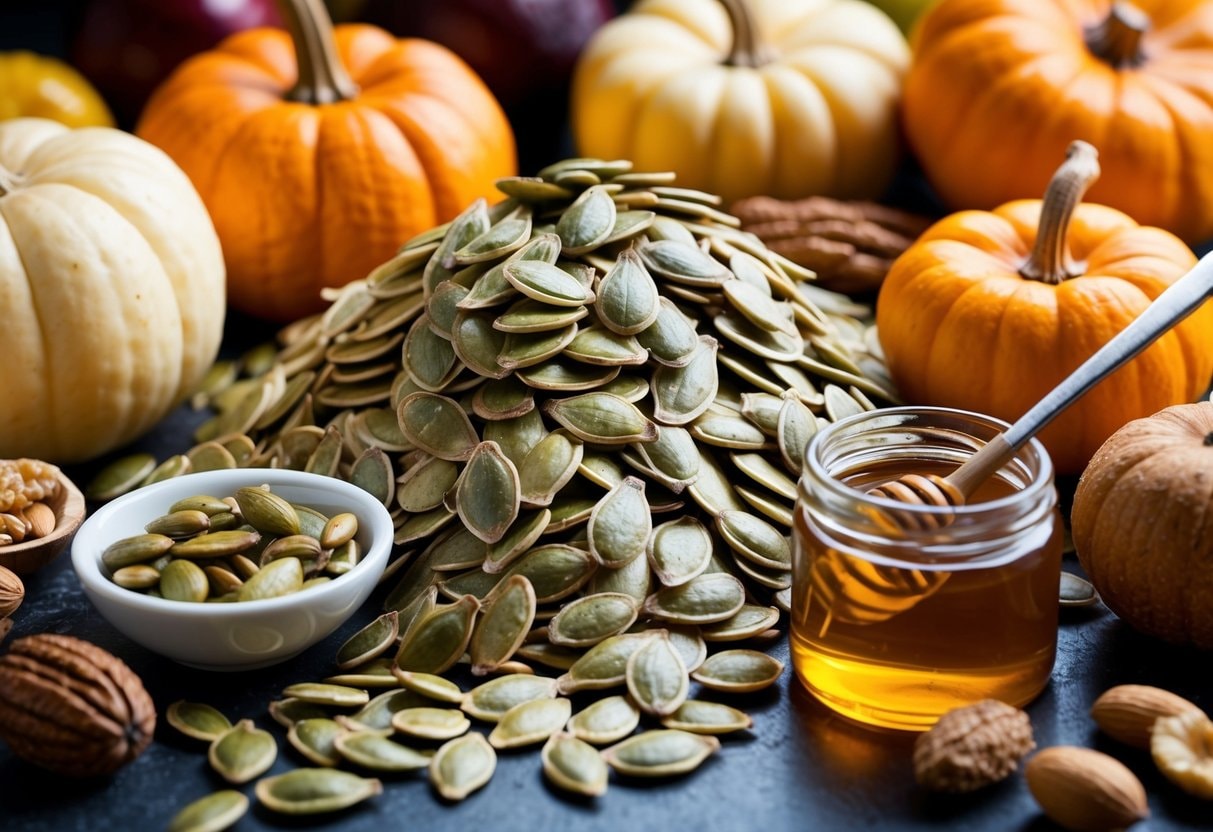
Pumpkin seeds are tiny powerhouses of nutrition. These small, green seeds pack a big punch regarding health benefits. Pumpkin seeds are rich in antioxidants, healthy fats, and minerals that can boost bone health, sexual well-being, and the immune system.
Many people enjoy pumpkin seeds as a tasty snack, but they’re versatile enough to add to many recipes. You can eat them raw, roasted, or ground into powder. They have a mild, nutty flavor that complements sweet and savory dishes.
Adding pumpkin seeds to your diet is easy and delicious. Sprinkle them on salads, mix them into yogurt, or use them as a crunchy topping for soups and stews. With so many ways to enjoy them, pumpkin seeds are a simple way to boost your nutrient intake.

Key Takeaways
-
Pumpkin seeds are nutrient-dense and offer many health benefits.
-
They can be eaten raw, roasted, or added to various recipes.
-
Pumpkin seeds are a versatile and tasty snack suitable for most diets.
Pumpkin Seed Nutrition Breakdown
Pumpkin seeds pack a powerful nutritional punch, showcasing impressive pumpkin seed nutritional benefits. They contain vitamins, minerals, protein, healthy fats, and beneficial plant compounds. These tiny seeds offer big health benefits.

Vitamins and Minerals
Pumpkin seeds are rich in several important minerals. They’re an excellent source of:
-
Zinc: Supports immune function and wound healing.
-
Magnesium: Vital for bone health and energy production.
-
Iron: Helps carry oxygen in the blood.
-
Phosphorus: Important for bone strength.
-
Manganese: Aids in metabolism and bone formation.
-
Copper: Supports heart health and immune function.
They also contain vitamin E, which acts as an antioxidant. Just one ounce of pumpkin seeds provides a good chunk of your daily needs for these nutrients.
Protein, Fiber, and Healthy Fats
Pumpkin seeds are a great plant-based protein source. One ounce contains about 7 grams of protein, including all essential amino acids.
They’re also high in fiber, which aids digestion and helps you feel full. The seeds contain about 2 grams of fiber per ounce.
Pumpkin seeds are packed with healthy fats, mainly unsaturated fatty acids. These include:
-
Omega-3 fatty acids.
-
Omega-6 fatty acids.
-
Oleic acid (a heart-healthy monounsaturated fat).
These fats help support heart health and reduce inflammation in the body.
Antioxidants and Anti-inflammatory Compounds
Pumpkin seeds are rich in antioxidants that help protect your cells from damage. They contain vitamin E, carotenoids, and zinc, all of which have antioxidant properties. The seeds also have anti-inflammatory effects. They contain compounds called lignans, which may help reduce inflammation.
Some studies suggest pumpkin seeds have anti-cancer properties. This is due to their high antioxidant content and unique plant compounds. Remember, while pumpkin seeds are nutritious, they’re also high in calories. Enjoy them in moderation as part of a balanced diet.

Bet You Didn't Know:
Pumpkin seeds can help with an overactive bladder. Their high magnesium content could improve bladder function. Some people eat a handful of seeds daily to support bladder health.
Health Benefits of Pumpkin Seeds
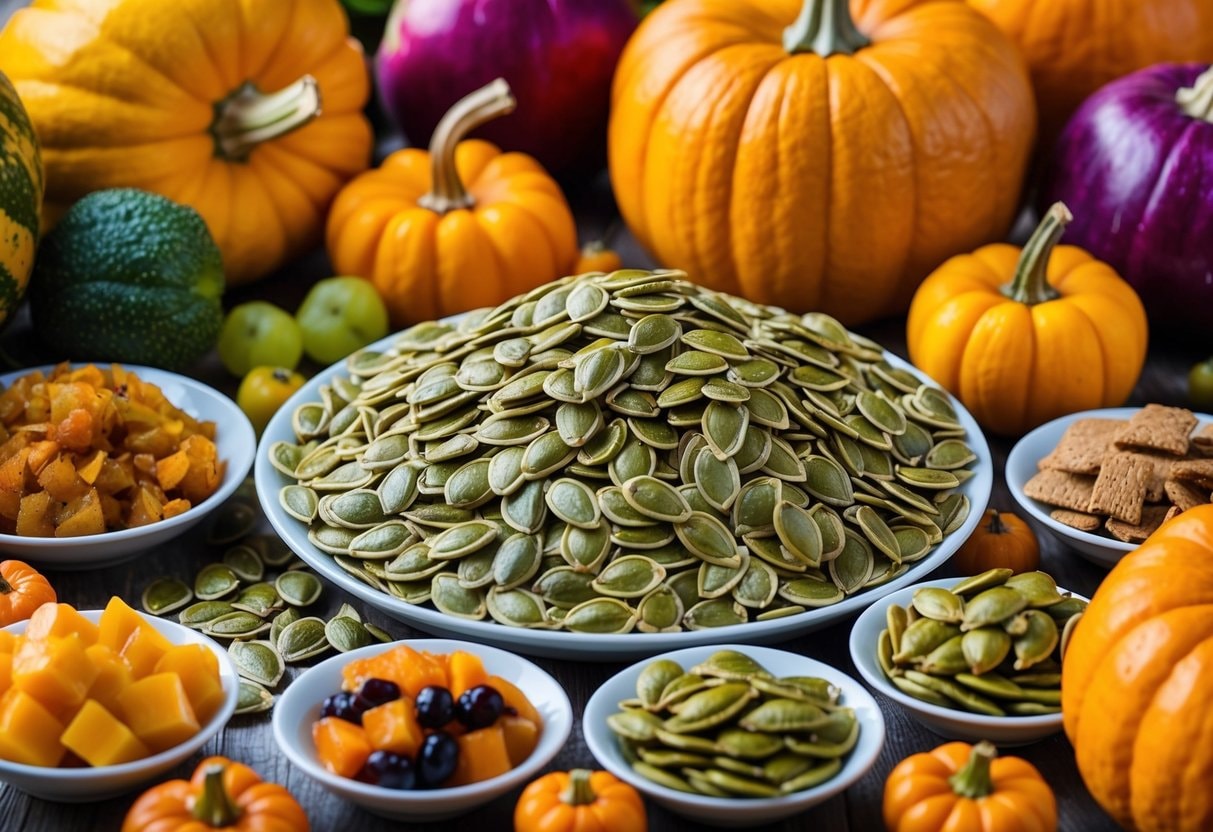
Pumpkin seeds offer a wide range of health benefits, highlighting their impressive pumpkin seed nutritional benefits. These tiny powerhouses can support heart health, blood sugar control, digestion, sleep, and more.
Heart Health and Blood Pressure
Pumpkin seeds are great for your heart. They contain healthy fats and magnesium that may help lower blood pressure. The seeds are also rich in zinc, which affects heart health. Eating pumpkin seeds regularly might reduce the risk of heart disease.
Their high antioxidant content helps protect against inflammation and oxidative stress, which can damage the heart. Some studies suggest that pumpkin seed oil may help lower cholesterol levels. This can further protect against heart problems.
Blood Sugar and Diabetes Management
Pumpkin seeds may help control blood sugar levels. They have a low glycemic index, meaning they don’t cause rapid spikes in blood sugar. The seeds are high in magnesium, which can improve insulin sensitivity.
This is especially helpful for people with type 2 diabetes. Eating pumpkin seeds as a snack can help stabilize blood sugar between meals. Their protein and fiber content also contributes to better blood sugar control.
Digestive Health and Weight Management
Pumpkin seeds are packed with fiber, which is key for good digestion. Fiber helps prevent constipation and promotes regular bowel movements. The seeds can also support weight management.
Their high protein and fiber content helps you feel full, which may reduce overeating. Pumpkin seeds are a nutrient-dense, low-calorie snack. This makes them a great choice for people trying to maintain a healthy weight.
Sleep Improvement
Pumpkin seeds help you sleep better. They contain tryptophan, an amino acid that the body uses to make serotonin.
Serotonin is then converted to melatonin, the hormone that regulates sleep cycles. Eating pumpkin seeds before bed might improve sleep quality.
The zinc in pumpkin seeds also plays a role in sleep. It helps the brain convert tryptophan to serotonin.
Prostate and Bone Health
Men’s prostate health may benefit from pumpkin seeds. The seeds contain compounds that help reduce symptoms of benign prostatic hyperplasia (BPH), a common prostate problem. Pumpkin seeds are also good for bone health.
They’re rich in zinc, magnesium, and phosphorus – all important minerals for strong bones. Regular consumption of pumpkin seeds might help prevent osteoporosis, especially in older adults.
Immune Support and Inflammation Reduction
Pumpkin seeds can boost your immune system. They’re high in zinc, which is crucial for immune function.
The seeds also have anti-inflammatory properties. This can help reduce inflammation throughout the body.
Eating pumpkin seeds regularly might help fight off colds and other infections. Their antioxidants also protect cells from damage, further supporting overall health.
Pumpkin Seed Nutritional Benefits: Incorporating Pumpkin Seeds into Your Diet
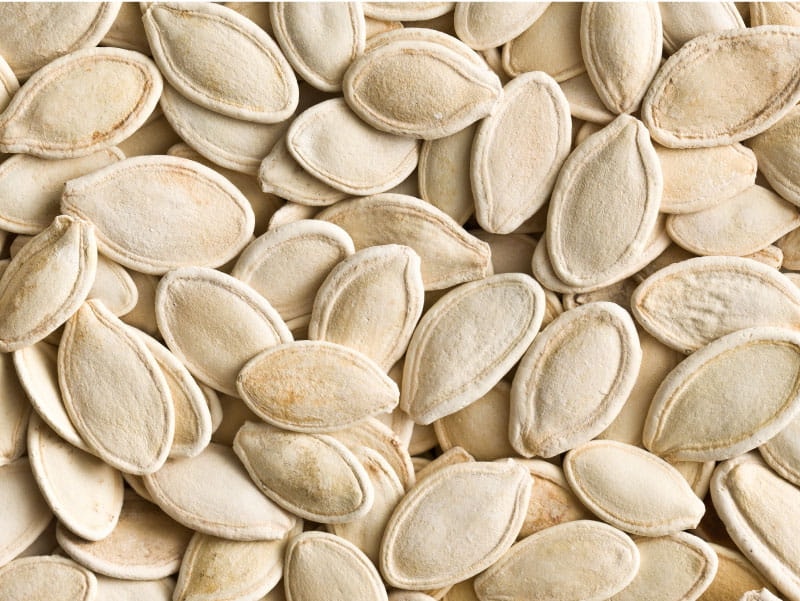
Adding pumpkin seeds to your meals is easy and tasty. There are many ways to enjoy these nutritious seeds as snacks, in cooking, and in baking.
Pumpkin Seed Snack Ideas
Pumpkin seeds make great snacks. Try roasting them with spices for a crunchy treat. Mix unsalted pumpkin seeds with dried fruit and nuts for a quick trail mix.
Sprinkle them on yogurt or oatmeal for added texture. Blend pepitas into smoothies for extra nutrients. Make your granola with pumpkin seeds, oats, and honey.
For a sweet twist, try chocolate-covered pumpkin seeds. They’re yummy and packed with goodness.
Cooking and Baking with Pumpkin Seeds
Pumpkin seeds are great for cooking and baking. Add them to salads for a nice crunch. Use them in pumpkin seed recipes like pesto or homemade bread.
Grind pumpkin seeds to make flour for gluten-free baking. Use pumpkin seed oil in dressings or drizzle it over roasted veggies. Try these ideas:
-
Add to muffins or cookies for extra nutrients.
-
Sprinkle on soups or pasta dishes.
Tips for Storing Pumpkin Seeds
Proper storage helps pumpkin seeds stay fresh longer. Keep them in an airtight container in a cool, dry place. They can last up to 3 months at room temperature. For longer shelf life, store them in the fridge. This can keep them fresh for up to a year.
You can also freeze pumpkin seeds for up to 2 years. Always check for signs of spoilage before eating. If they smell bad or look moldy, throw them out. Roasted seeds might not last as long as raw ones. Buy small amounts if you don’t use them often. This helps ensure you always have fresh seeds on hand.
Special Considerations and Allergies
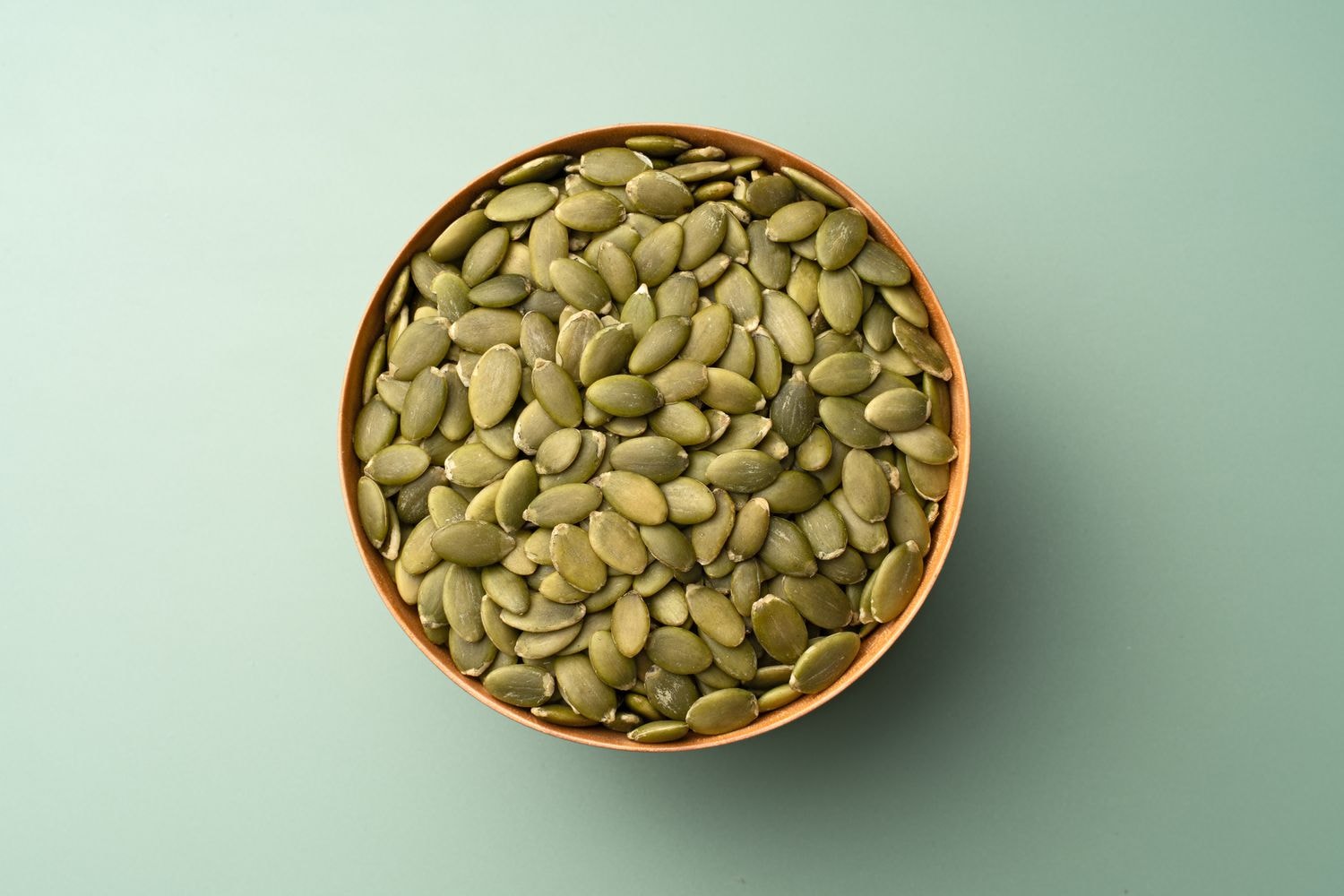
Pumpkin seeds are packed with nutrients, offering impressive pumpkin seed nutritional benefits, but there are a few things to keep in mind. Some people may need to be careful when eating them.
Allergies to pumpkin seeds are rare, but they can happen. Signs of an allergy may include itching, swelling, or trouble breathing. Stop eating the seeds and talk to a doctor if you notice these symptoms.
Salt Intake
Those watching their salt intake should be mindful of sodium content. Many packaged pumpkin seeds are high in salt. Look for low-sodium options, or try unsalted seeds instead. Pumpkin seeds are low in carbohydrates, which is good news for people following low-carb diets. A small handful can be a nutritious snack without adding too many carbs.
Always Check the Label
When buying pumpkin seeds, check the label. Some brands add extra ingredients that might not fit your diet needs. Raw or plain roasted seeds are often the best choice.
If you have any health issues, it’s always a good idea to chat with your doctor before adding new foods to your diet. They can help you figure out if pumpkin seeds are right for you.
Other Uses of Pumpkin Seeds
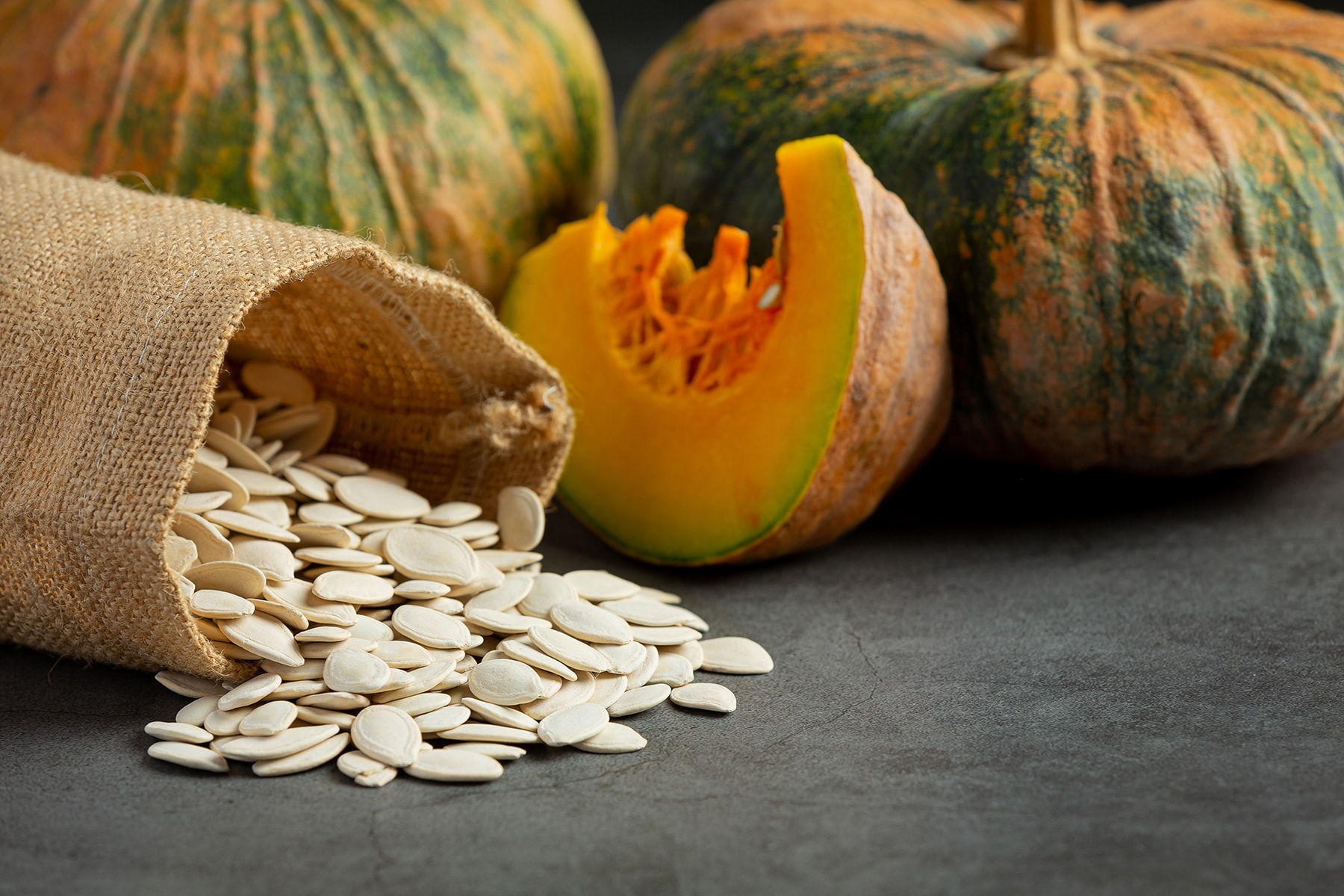
Pumpkin seeds offer benefits beyond nutrition. The pumpkin seed’s nutritional benefits include promoting healthy hair and skin, which may help balance hormones in the body.
Pumpkin Seeds for Hair and Skin Health
Pumpkin seeds contain nutrients that support hair and skin health. They are rich in zinc, which helps with hair growth and skin repair. The seeds also have vitamin E, an antioxidant that protects skin cells from damage.
People can eat pumpkin seeds or use pumpkin seed oil for hair care. The oil can be applied directly to the scalp to nourish hair follicles. This may help with hair loss and promote thicker, shinier hair. Pumpkin seeds can boost skin health, too.
Their fatty acids help keep skin moisturized. The seeds’ antioxidants fight free radicals that cause skin aging. Some people add ground pumpkin seeds to face masks for a natural skin treatment.
Pumpkin Seeds and Hormonal Balance
Pumpkin seeds may help balance hormones in both men and women. They contain plant compounds that can affect hormone levels in the body.
For men, pumpkin seeds might boost testosterone levels. The seeds are high in zinc, which is important for male fertility. Some studies suggest that eating pumpkin seeds may support prostate health, too.
Women may benefit from pumpkin seeds during menopause. The seeds contain phytoestrogens, plant-based compounds that act like estrogen in the body. This might help ease some menopause symptoms.
Here’s an additional video about the benefits of pumpkin seeds.
By: MEDSimplified
Unlocking the Full Potential of Pumpkin Seeds: A Nutritional Powerhouse
In conclusion, pumpkin seeds are an incredible nutrient source that offers numerous health benefits. With their rich content of magnesium, zinc, healthy fats, and plant-based protein, they support heart health, improve sleep, enhance digestion, and help regulate blood sugar levels. Their versatility makes them easy to incorporate into your diet, whether as a snack or an ingredient in various recipes, such as salads, smoothies, and baked goods. Pumpkin seeds provide a powerful nutritional boost that contributes to overall well-being and offers a natural way to support a healthy lifestyle.

These tiny seeds pack a punch nutritionally and offer benefits beyond just diet. Their nutrients can help promote healthy skin, support hair growth, and even aid hormonal balance. Incorporating pumpkin seeds into your routine is a simple yet effective way to enhance your health and elevate your meals. By recognizing their impressive potential, you’ll understand why pumpkin seeds deserve a regular spot in your pantry for their flavor and abundant nutritional value.
Frequently Asked Questions
Pumpkin seeds offer many health benefits for both men and women. They can boost sexual health, improve skin, and enhance overall wellness. Let’s explore some common questions about these nutritious seeds.
Are There Any Drawbacks to Including Pumpkin Seeds in One's Diet?
While pumpkin seeds are healthy, eating too many can cause issues. They’re high in calories so that overeating may lead to weight gain. Some people might have trouble digesting raw pumpkin seeds. Soaking them first can help with this problem.
What Are the Suggested Ways to Incorporate Pumpkin Seeds Into My Everyday Meals?
Adding pumpkin seeds to meals is easy. Sprinkle them on salads for a crunchy boost. Mix them into yogurt or oatmeal for breakfast. You can also add them to baked goods like muffins or bread. Roasted pumpkin seeds make a tasty, healthy snack on their own.
What Are the Skin and Overall Health Benefits of Eating Pumpkin Seeds?
Pumpkin seeds can improve skin health. Their vitamin E content helps protect skin cells from damage. Zinc in the seeds may help with acne and wound healing. For overall health, pumpkin seeds offer many perks. They’re packed with antioxidants that fight inflammation. The seeds’ magnesium content supports bone health and may help with sleep.
Join Us on Social Platforms
🔹 Instagram: Dive into a world of mouthwatering plant-based meals by following us on Instagram at _veganglobetrotter.
🔹 Facebook: Become part of our vibrant community on Facebook at VeganGlobetrotter, where we share practical vegan tips and creative recipes.
🔹 Pinterest: Discover a treasure trove of wellness ideas and plant-based inspiration on our Pinterest account, theveganglobetrotter.
🔹 Twitter: Stay in the loop with the latest vegan trends and insightful content by following us on Twitter at VeganGlobetrot.



Don't miss out
when new recipes and information are added!
Join our newsletter for free recipes,
healthy living inspiration, and special offers
You have Successfully Subscribed!